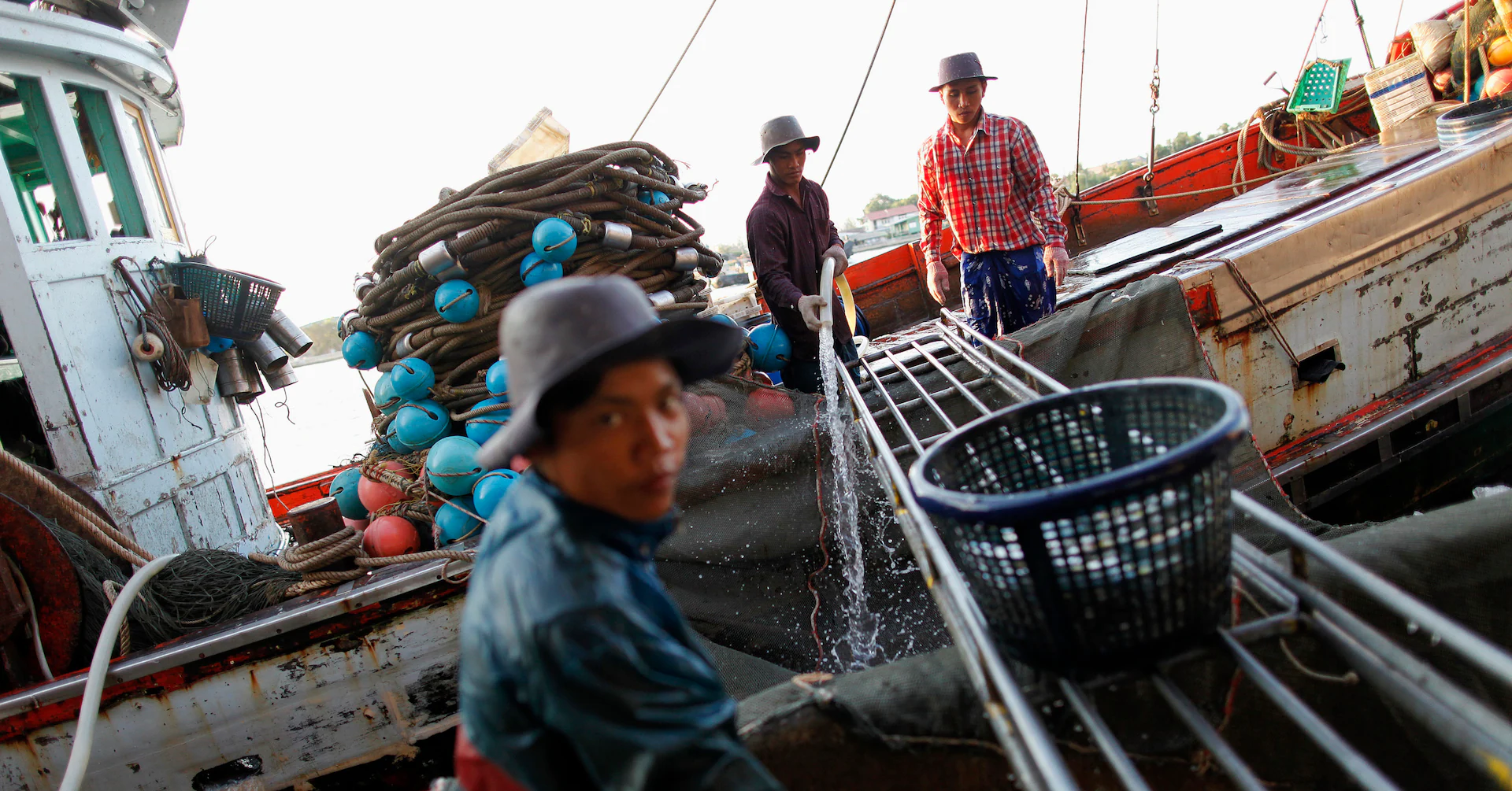
Summary
Workers on distant-water fleets face 18-hour shifts, physical abuse and months without pay
Four Indonesian fishers suing tuna provider BumbleBee foods under U.S. law in landmark case
Despite reforms, just one in five Thai fishing vessels found to comply fully with labour regulations
MSC has certified fisheries linked to labour abuses, raising concerns about credibility of label
Women working in seafood processing often earn low wages and face high rates of harassment
August 25 – Fishing is one of the world’s most dangerous occupations, with mariners enduring long hours, low pay, harsh weather and work with dangerous equipment.
Spending months – even years – on the open seas, far from oversight, workers on commercial fishing boats are also among the most vulnerable to egregious human rights violations, such as human trafficking, slavery, abandonment and harassment, according to the International Labour Organization.
“The ocean comprises some of the worst supervised parts of the Earth, where anything can happen,” says Miren Gutierrez, research associate with the UK’s Overseas Development Institute. “Shipowners frequently use ‘flags of convenience’, registering their vessels in countries with minimal regulatory oversight, which makes it difficult to enforce labour standards or hold owners accountable.”
She adds that many seafarers are migrants who may not know their rights or how to seek help. They’re made more vulnerable because they might be their family’s sole breadwinner.
As a result, some 128,000 fishers are trapped in forced labour on remote vessels worldwide and the industry has one of the highest occupational fatality rates, with 100,000 fishers estimated to die each year.
According to the International Transport Workers’ Federation, more than 2,200 seafarers have been abandoned so far this year, left without pay, food or medical support.
Many studies highlight the link between labour abuses and illegal, unreported and unregulated (IUU) fishing. But while there are in-country and international regulations, enforcement is patchy and, for such a highly traded global commodity as fish, there’s no harmonisation of human rights legislation.
The extent to which the seafood industry is exercising human rights due diligence in its supply chains is under the spotlight in the U.S. Four Indonesian men are suing one of America’s largest canned tuna companies, Bumble Bee Foods, under the U.S. Trafficking Victims Protection Reauthorization Act (TVPRA). It holds companies responsible if they knew or should have known about forced labour in their supply chains.
The men allege forced labour on board Chinese-owned longline vessels that supply tuna to Bumble Bee. Because the fishing vessels stayed at sea, transferring their catch to supply ships – a practice known as transshipment – the men say they were isolated, and were subjected to beatings, refusal of medical care and a lack of food.
Sari Heidenreich, senior human rights adviser at Greenpeace USA, says the lawsuit sends “an incredibly important signal to the seafood industry that you cannot operate with impunity, that there are laws and you have responsibilities, and if you ‘knew or should have known’ you could be held accountable.”
California-based Bumble Bee, which is owned by Taiwanese tuna trader FCF, told The Ethical Corporation that it would not comment on pending legislation, but in its deposition to the court said it “unequivocally condemns forced labour and takes allegations of forced labour in its supply chain seriously.”
It added that “when Bumble Bee learned of the allegations in the complaint, it promptly instructed its suppliers to cease purchasing from the vessels at issue.”
Bumble Bee’s deposition says that it had enacted policies to promote responsible sourcing in its supply chain, but that “developing an effective long-term solution would require the help of many actors, including governments.”
It disputes the notion that companies should be held liable for abuses by foreign actors in their supply chain, describing it as a “limitless theory of liability.”
Heidenreich, however, pointed out that since 2015, under its Trace My Catch programme, Bumble Bee has claimed that customers can trace each can of tuna back to the boat that caught it, demonstrating that it has been able to map its supply chain. However, in a 2022 investigation, Greenpeace East Asia alleged that there were some inaccuracies in the traceability tool, and that it had found instances of sourcing from vessels involved in IUU fishing and forced labour.
Now, says Heidenreich, it is attempting to distance itself from its suppliers. “Bumble Bee cannot have it both ways. The TVPRA and trade law make clear that corporate responsibility doesn’t stop at the U.S. border. Companies that cannot take responsibility for the products they sell have no business selling them.”
Bumble Bee’s sustainability report highlights a commitment to both environmental sustainability and social responsibility. It is pursuing Marine Stewardship Council certification for all its fisheries and is ranked number one in the U.S. for having MSC eco-labelled products.
However, NGOs have criticised MSC for not doing enough to address social risk in the seafood industry. Earlier this year, a group of them, the Seafood Working Group, wrote an open letter calling on the MSC to be accountable for “the role of its social policies and processes in enabling abuse of workers in certified fisheries, and its attendant role in instances of certifying fish produced under conditions of labour exploitation.”
MSC’s own analysis of mechanisms to mitigate against forced and child labour within its certified fisheries revealed big variations, for example in recruitment practices, and monitoring and enforcement.
An MSC spokesperson told The Ethical Corporation that its ecolabel “makes no social claims” but that the organisation is “reviewing our efforts to best support the seafood sector to make progress.”
The World Benchmarking Alliance Seafood Stewardship Index of the 30 most influential companies in the industry found that just nine of them disclosed having started to implement human rights due diligence.
FCF, Bumble Bee’s owner, ranks 12 on the list for social responsibility, scoring 6.5 out of 40.
The best performer on the index is Thai Union, the world’s largest canned tuna producer, which introduced extensive due diligence following a forced labour scandal 10 years ago. WBA’s assessment says the group is marked out by “its efforts to ensure decent working and living conditions on board fishing vessels, whilst monitoring for compliance and providing evidence of improvements.”
The Thai seafood industry as a whole was warned by the EU in 2015 for failing to prevent IUU fishing, but the trade ban was lifted in 2019 after the Thai government’s efforts to tackle human trafficking and improve workers’ conditions. Last year the government began moves to roll back some of those reforms, although these efforts seem to have stalled in parliament.
The FAIRR initiative, which aims to drive investor awareness of risks in the food sector, recently engaged with seven major seafood companies. All of the companies disclosed supplier guidelines for environmental and social issues, but self-assessment questionnaires were generally used to demonstrate compliance.
FAIRR says two of the companies acknowledged that these measures were “insufficient to identify and mitigate risks such as IUU and human rights issues,” which underlined the need to tighten up traceability regulations and enforcement.
Natasha Stromberg, FAIRR’s director of thematic research and corporate innovation, notes that historically, the ocean was “out of sight, out of mind, but I think the fact that we know that fish stocks are becoming scarcer, it makes us look at the industry in more general terms, not just about the fish but the people who are working in it.”
She also suggests that investors need to be aware of risks on land in fish processing plants, where a large proportion of workers are female. She adds: “If you’re sending products to Europe, and you do have an endemic issue with gender-based harassment, and 60% of your workers within the processing plants are female, that is a material risk. We’ve seen it in the garment industry.”
While there are regulations to protect fishers, such as the ILO’s Work in Fish Convention, they have not been widely adopted.
There had been hopes for a muscular approach from the EU, which at the end of 2024 passed the Forced Labour Regulation banning the sale, import and export of goods made using forced labour. It applies to all companies, regardless of size, but won’t come into effect until the end of 2027.
The Forced Labour Regulation was meant to mesh with the bloc’s Corporate Sustainability Due Diligence Directive (CSDDD), signed into law last year, and which categorises fisheries as a high-risk sector for human rights impacts, but this is being unpicked.
Observers say that not having due diligence in their supply chains leaves companies more exposed to the risk of forced labour, and with it financial and reputational risk.
The ODI’s Gutierrez worries that weakening the EU’s CSDDD “risks perpetuating loopholes that allow harmful practices to persist.” She says voluntary measures “are a step in the right direction (but) have proven insufficient to address the scale and complexity of IUU and unsustainable fishing.”
Heidenreich of Greenpeace USA argues that “companies need to work to end isolation at sea, because that is one of the key things that enables a lot of abuses.” NGOs are calling for the right to collective action, the availability of free and secure Wi-Fi at sea, capping the time workers can spend at sea to three months, and having complete electronic or human monitoring on board vessels.
She points out that while the environmental crisis in the ocean has been a big focus of global concern, far less attention has been paid to the human implications of IUU and seafarers being forced to spend even longer at sea.
“Environmental degradation and human rights violations are intertwined,” she says. “We need to address them together.”
This article is part of the August-September issue of Ethical Corporation magazine, on the struggle to safeguard human rights. You can download the digital pdf by clicking here
Opinions expressed are those of the author. They do not reflect the views of Reuters News, which, under the Trust Principles, is committed to integrity, independence, and freedom from bias. Ethical Corporation Magazine, a part of Reuters Professional, is owned by Thomson Reuters and operates independently of Reuters News.
Angeli Mehta writes the Policy Watch column for Ethical Corporation, Thomson Reuters’ sustainable business magazine. She is a science writer with a particular interest in the environment and sustainability. Previously, she produced programmes for BBC Current Affairs and has a research PHD. @AngeliMehta



